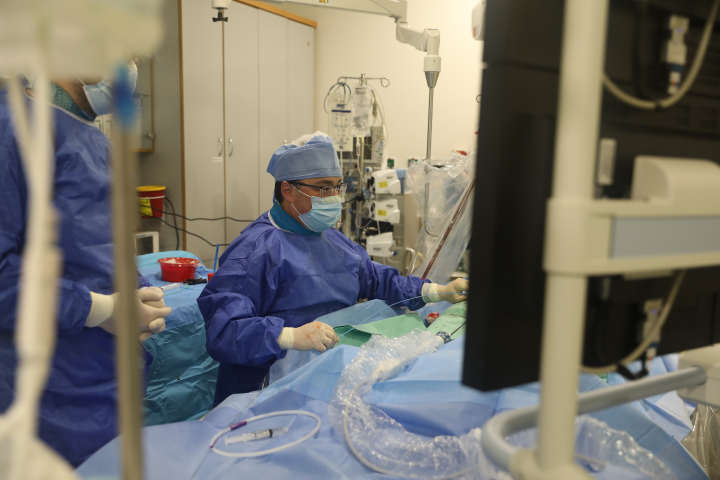A patient with a rare congenital heart defect that affects several members of her family was successfully treated at Rambam Health Care Campus. This rare defect occurs in approximately one in 1,000 births.
 Dr. Sergei Yalonetsky performing a cardiac catheterization. Photography: Rambam HCC
Dr. Sergei Yalonetsky performing a cardiac catheterization. Photography: Rambam HCC
A young woman in her 20s from Northern Israel became the third member of her family to undergo a medical procedure to repair a hole in the wall separating the two upper chambers in her heart. The young woman’s father and younger sister also suffered from the same anomaly and were treated several years ago.
This congenital defect, a pathologic opening between the right and left atria known as Atrial Septal Defect (ASD), may result from a defective gene passed from generation to generation. Nevertheless, having three first-degree relatives—the father and two sisters—with the same birth defect is rare. “The defect impairs quality of life, and without appropriate treatment may develop into heart failure and endanger the lives of the people who suffer from it,” explains Dr. Sergei Yalonetsky, Attending Physician in the Interventional Cardiology Unit and head of the Adult Congenital Heart Defect Service at Rambam, who handled the case. “If in the past it was customary to treat these defects through open heart surgery, today the opening can be effectively closed in a catheterization procedure.”
The young woman recently came to the Interventional Cardiology Unit at Rambam and underwent heart catheterization. An umbrella-like device was inserted into the atria to block the abnormal opening and restore normal cardiac function. “Eventually, the device will become an integral part of the young woman’s heart, and she is expected to enjoy a perfectly normal life, just like her father and sister before her.” says Dr. Yalonetsky.
Twenty-four hours after the catheterization, the young woman was released to her home feeling well. “Family medical history in this case is vitally important to saving lives,” concludes Dr. Yalonetsky. “The father passed this heart defect to his daughters, but he also saved their lives with discovery of his condition and timely, effective treatment. It is very important in such cases that first-degree family members come to be examined and ensure that they are in good health.”

